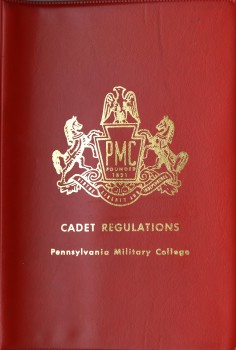 Theodore Hyatt modeled PMC after West Point. Colonel Charles Hyatt often called PMC the “West Point of the Keystone State.” Besides adopting West Point’s curriculum and uniform, wherever possible, the rules and regulations of West Point were also adopted. This made the published Regulation Book, supplemented by General and Special Orders, the single most important book and influence on a PMC Cadet. When Frank Hyatt became President and Commandant of Cadets in 1930, a series of changes in the regulations were started that greatly altered the life of a Cadet. Yet, much remained the same. In later years, the PMC Regulation Book was configured as a bright red, three-ring binder that was required to be displayed in every Cadet room at each Saturday Morning Inspection.
Theodore Hyatt modeled PMC after West Point. Colonel Charles Hyatt often called PMC the “West Point of the Keystone State.” Besides adopting West Point’s curriculum and uniform, wherever possible, the rules and regulations of West Point were also adopted. This made the published Regulation Book, supplemented by General and Special Orders, the single most important book and influence on a PMC Cadet. When Frank Hyatt became President and Commandant of Cadets in 1930, a series of changes in the regulations were started that greatly altered the life of a Cadet. Yet, much remained the same. In later years, the PMC Regulation Book was configured as a bright red, three-ring binder that was required to be displayed in every Cadet room at each Saturday Morning Inspection.
The Cadet that violated the major rules of PMC, such as alcohol, stealing, and dishonesty, was still subject to dismissal. Cadets who failed to “measure up to” and maintain the standards of the Corps were given written Delinquency Reports or “DR’s”. Cadets might be reported for improper attitude, conduct unbecoming a cadet, slovenly appearance, or a disorderly room. The Cadet Company Commander, based on the seriousness of the report, would assign demerits. As in 1925, Cadets were allowed a weekly demerit allowance, but were “awarded” Punishment Tours for demerits in excess of the weekly allowance. These walking tours were not less than one hour and were served on Saturday and Sunday afternoons on the blacktop behind Old Main and directly below the Commandant’s Office.
 As important as the regulation book was, the adjutant of PMC was responsible for discipline and the operation of the college. In 1917, Edward “Dutch” Brautigam ’07 was appointed Adjutant and Professor of Mathematics and Military Science. He served in these posts until 1930. He is best remembered as one of the most respected adjutants in the history of the College. During his tenure, the discipline and operation of PMC differed little from the time he was a Cadet. Between 1956 and 1962, CPT Giulio “Dee” DiSerafino ’52 served as adjutant and later Assistant Commandant of the Corps. He followed in Brautigam’s footsteps and maintained the standards of the Corps. CPT DiSerafino also became an inspiration to many and was well respected by those who knew him.
As important as the regulation book was, the adjutant of PMC was responsible for discipline and the operation of the college. In 1917, Edward “Dutch” Brautigam ’07 was appointed Adjutant and Professor of Mathematics and Military Science. He served in these posts until 1930. He is best remembered as one of the most respected adjutants in the history of the College. During his tenure, the discipline and operation of PMC differed little from the time he was a Cadet. Between 1956 and 1962, CPT Giulio “Dee” DiSerafino ’52 served as adjutant and later Assistant Commandant of the Corps. He followed in Brautigam’s footsteps and maintained the standards of the Corps. CPT DiSerafino also became an inspiration to many and was well respected by those who knew him.

